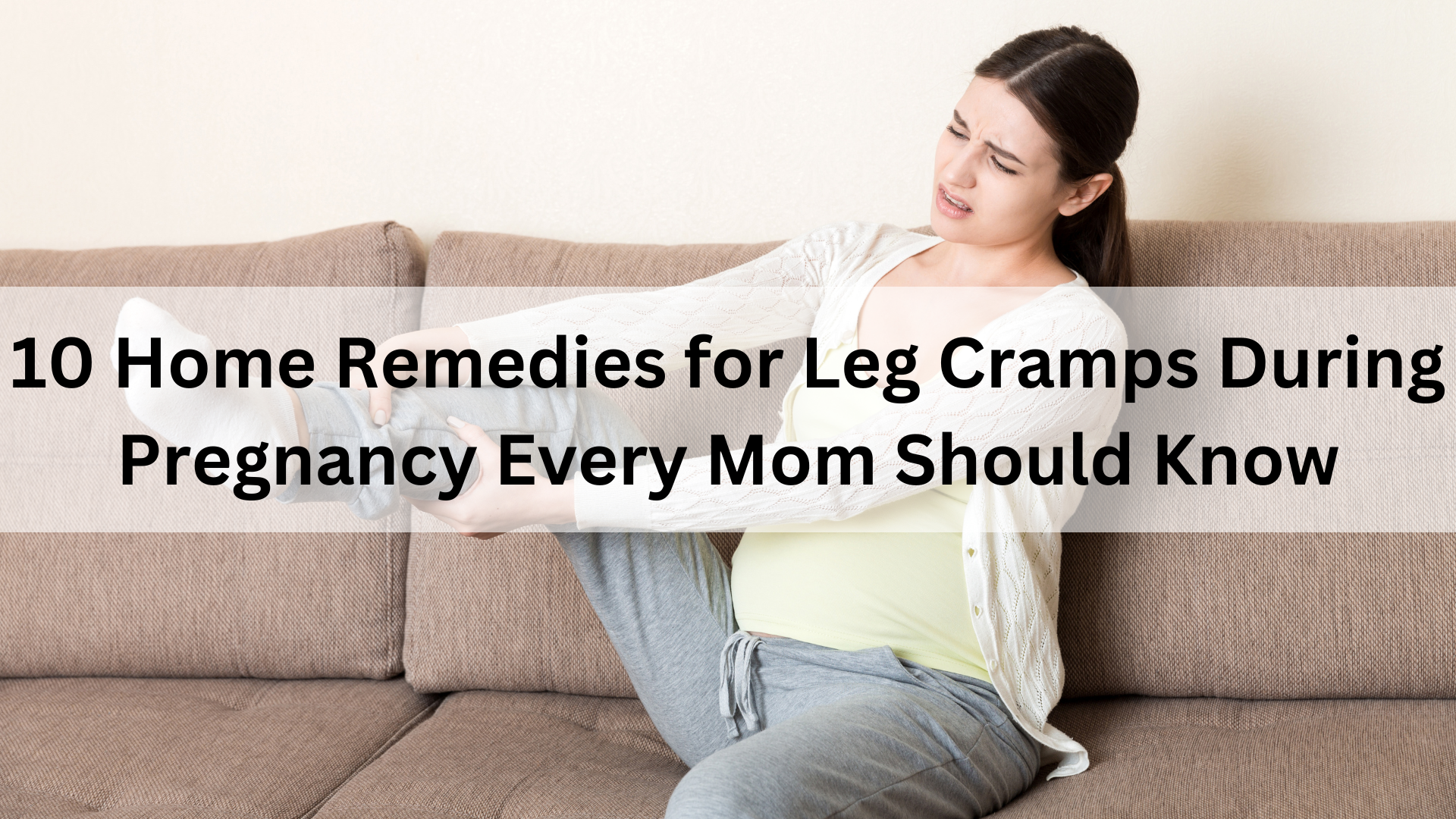
10 Home Remedies for Leg Cramps During Pregnancy Every Mom Should Know
Introduction | Why Do Leg Cramps During Pregnancy Happen? | 10 Home Remedies for Leg Cramps During Pregnancy | Other Tips to Prevent Leg Cramps | Conclusion | FAQs | References
Key Takeaways-
1) Up to 30% to 50% of pregnant women suffer from leg cramps, especially in the third trimester. Almost two‐thirds of these women experience leg cramps twice per week and they can occur at any time, particularly at night.
2) Nutrient Deficiency Plays a Role – Lack of magnesium, potassium, and calcium is linked to increased cramping during pregnancy.
3) Proper Footwear & Positioning – Wearing supportive shoes and sleeping on your left side can improve circulation and reduce cramping episodes
4) Elevate Your Legs – Propping up your legs while resting improves circulation and reduces pressure on your muscles, helping to prevent cramps.
5) Massage and Heat – Massaging cramped muscles and applying a warm compress can immediately relieve cramping. To know more about such effective home remedies read ahead, and know what all you need to know to get rid of it.

Pregnancy is a beautiful and transformative journey, marked by moments of joy, anticipation, and physical changes. But it can also bring unexpected challenges like leg cramps, especially in the middle of the night. These painful spasms, often targeting the calves, interrupt your sleep and leave you feeling exhausted.
Did you know that nearly 30 % to 50% of pregnant women experience leg cramps during pregnancy, particularly in the second and third trimesters when the body undergoes significant changes to support the growing baby? [1]
While leg cramps during early pregnancy are less common, some women may still experience them as early as two weeks into their journey. Understanding why these cramps happen and how to alleviate them is the key to enjoying a more comfortable and happy pregnancy.
Moms, let's understand the root causes of leg cramps during pregnancy and find out 10 effective remedies in preventing and treating leg cramps during pregnancy. From dietary changes to gentle exercises and hydration, there are simple yet effective strategies to reduce the frequency and intensity of cramps, allowing you to rest better and enjoy a smoother pregnancy experience. Let's dive deeper into the solutions.
Why Do Leg Cramps During Pregnancy Happen?
Leg cramps during pregnancy, particularly at night, are a common and often painful occurrence for many expectant mothers, While they are usually harmless, understanding the root causes behind these cramps can help you find relief and prevent them.
However, it's essential to remember that every woman's pregnancy journey is unique; what triggers cramps for one may not affect another.
Additionally, symptoms can vary, with some experiencing mild discomfort and others more intense pain. The potential causes can be:
1. Increased Weight
As your pregnancy progresses, your baby grows and your body naturally gains weight to support your little one. This added weight, especially in the later stages of pregnancy, places increased pressure on your legs, particularly the muscles in your calves and thighs. Over time, this additional stress can lead to muscle fatigue, which is one of the primary causes of leg cramps during pregnancy.
The muscles work harder than usual to support the extra load, especially when you are standing or walking for extended periods. As a result, these overworked muscles can contract involuntarily, leading to painful cramps that often strike during the night when your body is at rest.
2. Circulation Changes
Pregnancy brings significant changes to your circulatory system. As your body prepares to support the growing baby, your blood volume increases by up to 50%. While this is essential for nourishing your baby, it can sometimes cause circulation to slow down, particularly in your legs. [2]
This sluggish circulation can result in reduced oxygen and nutrient supply to your muscles, which makes them more prone to cramping. Additionally, the growing uterus can press on veins and arteries, further restricting blood flow to the lower part of your body. Poor circulation can also cause fluid retention in your legs, leading to swelling (edema) and discomfort, which can worsen leg cramps during pregnancy.
3. Hormonal Shifts
Pregnancy hormones, particularly progesterone, play a crucial role in preparing your body for childbirth. [3] However, these hormones also have an impact on your muscles and joints. Progesterone, for instance, relaxes smooth muscle tissue throughout your body, including the walls of your blood vessels, which can slow circulation and contribute to muscle cramping.
Furthermore, the hormone relaxin, which is released to help soften ligaments and prepare your body for labor, can also affect muscle function. Relaxin loosens the muscles and joints, making them more prone to strain and spasms. These hormonal shifts are a natural part of pregnancy but can unfortunately make your muscles more susceptible to cramps, especially in the legs.
4. Mineral Deficiencies
Leg cramps during pregnancy can also be triggered by deficiencies in key minerals such as magnesium, calcium, and potassium. [4] These minerals play a vital role in muscle function and contraction, and when their levels dip, it can lead to muscle spasms and cramping.
-
Magnesium Deficiency: Magnesium is essential for proper muscle relaxation. Without enough magnesium, muscles may become overly tense, leading to frequent cramps. During pregnancy, your body needs more magnesium than usual to support the development of your baby's bones and tissues, making you more susceptible to a deficiency.
-
Calcium Deficiency: Calcium is crucial for muscle contractions, and a deficiency can cause the muscles to contract improperly or involuntarily, resulting in cramps. As your baby grows, your body prioritizes calcium for the developing fetus, leaving your muscles deprived of the amount they need to function smoothly.
- Potassium Deficiency: Potassium helps regulate fluid balance and muscle contractions. A lack of potassium can lead to muscle weakness, fatigue, and cramping. During pregnancy, potassium is used to maintain the health of both mother and baby, and any shortfall in intake can lead to cramps in the legs.
To combat these deficiencies, it's important to ensure your diet includes sufficient levels of these minerals. You can do this by eating magnesium-rich foods like leafy greens and nuts, calcium-rich foods like dairy products, and potassium-rich foods like bananas and avocados. In some cases, your healthcare expert may recommend supplements to help prevent leg cramps.
5. Dehydration
Hydration plays a crucial role in maintaining muscle health. When your body becomes dehydrated, your muscles are more likely to cramp due to an imbalance in electrolytes like sodium, potassium, and calcium. These electrolytes help muscles function properly, and when you're dehydrated, your muscles can become irritable and prone to spasms.
Pregnant women are more prone to dehydration due to increased fluid requirements, as your body uses more water to produce extra blood, build amniotic fluid, and maintain the placenta. [5] If you're not drinking enough water, it can lead to dehydration and worsen leg cramps during pregnancy.
6. Physical Activity and Fatigue
Physical activity can have both positive and negative effects during pregnancy. While regular, moderate exercise is beneficial for circulation and overall health, over-exertion can lead to muscle fatigue and cramping. If your leg muscles are tired from standing, walking, or other forms of activity, they are more likely to cramp, especially at night when they are trying to relax.
On the other hand, too little physical activity can also contribute to leg cramps. If you are sedentary for long periods, your leg muscles may weaken or tighten, which can lead to cramping when you do move. Striking the right balance of movement is key. Gentle exercises like walking or prenatal yoga can help keep muscles flexible and reduce cramping.
7. Pressure from the Uterus
As your pregnancy progresses, the uterus expands to accommodate the growing baby. This expansion can put pressure on the nerves and blood vessels that run to and from your legs, leading to reduced blood flow and making cramps more likely.
The weight of the uterus, particularly in the third trimester, can also cause increased pressure on the veins in the lower part of your body, contributing to sluggish circulation and muscle cramps, especially at night.
10 Home Remedies for Leg Cramps During Pregnancy
Leg cramps during pregnancy, especially in the second and third trimesters, are a common discomfort for many expectant mothers. These painful spasms, which frequently occur at night, can disrupt your sleep and leave your legs feeling sore. Fortunately, there are a variety of effective home remedies and lifestyle adjustments that can help prevent and alleviate leg cramps. Here are 10 remedies that every pregnant mom should know:
| Home Remedies | Description |
|
Stay Hydrated 
|
One of the simplest and most effective remedies for leg cramps during pregnancy is staying hydrated. Dehydration can cause an imbalance in your electrolytes, which increases the risk of muscle cramps, including leg cramps during early pregnancy. Your body requires more fluids to support your growing baby and to produce extra blood and amniotic fluid. Make sure you're drinking at least 8-10 glasses of water a day to keep your muscles well-hydrated. If you struggle with plain water, you can increase your fluid intake by adding water-rich foods to your diet, such as cucumbers, watermelons, oranges, and strawberries. Broths and soups are also good sources of hydration. Keeping a bottle of water with you throughout the day is a great way to remind yourself to sip regularly, ensuring you're maintaining proper hydration levels. You can also try to add electrolytes, rather than drinking plain water, so that the body gets enriched with minerals and keeps cramps at bay. |
|
Stretch Before Bed  |
Leg cramps pregnancy sufferers often experience are most likely to strike at night. To combat this, make a habit of stretching your calf muscles before bed. A few minutes of gentle stretching can help prevent the sudden onset of cramps by loosening tight muscles and promoting blood flow. Calf stretches are particularly effective. Here's how you can do a simple one: stand facing a wall, place your hands on the wall for support, step one foot back while keeping the leg straight, and bend your front knee. You should feel a stretch in your calf muscle of the extended leg. Hold this position for 30-60 seconds, then switch legs. Stretching not only eases muscle tension but also helps prevent those painful spasms that tend to wake you up during the night. |
|
Warm Compress or Bath  |
A warm compress or a soothing warm bath is an effective remedy for easing leg cramps during pregnancy. Warmth helps improve blood flow to the affected muscles and relaxes them, relieving tension and reducing pain.
Just make sure the water isn't too hot, as excessive heat isn't recommended during pregnancy. |
|
Magnesium-Rich Diet & Epsom Salt Bath  |
Magnesium deficiency is one of the reasons for leg cramps in early pregnancy. Magnesium plays a key role in muscle relaxation, and a lack of it can lead to muscle tension and cramps. However, this is a deficiency that can be easily addressed through diet and supplements. [6]
|
|
Elevate Your Legs  |
Elevating your legs whenever possible can help improve blood flow and reduce the pressure on your leg muscles, making this a simple yet effective remedy for leg cramps during pregnancy. When blood flow is enhanced, muscles receive the oxygen and nutrients they need, reducing the chances of cramping.
This remedy is particularly helpful for reducing nighttime cramps since elevating your legs while you rest improves blood circulation and eases tension in your muscles. |
|
Foot Exercises  |
Simple foot exercises can do wonders for preventing leg cramps during pregnancy by improving circulation and keeping your muscles active. These exercises can be done in bed, at work, or while you're relaxing at home. [7] Here are a few easy foot exercises to try:
Performing these exercises regularly can help reduce the frequency of leg cramps and improve muscle flexibility. |
|
Massage  |
A gentle massage is also a good remedy for relieving leg cramps during pregnancy. Massaging the muscles can help relax them, promote better circulation, and ease tension. [8]
Regular massages, especially in the evening, can help keep muscles relaxed and reduce the risk of cramps while you sleep. |
|
Potassium-Rich Foods  |
Potassium is essential for muscle health and helps maintain proper fluid and electrolyte balance in the body. [9] A potassium deficiency can lead to frequent leg cramps during pregnancy. Incorporating potassium-rich foods into your diet can reduce the chances of experiencing cramps and improve muscle function. Some potassium-rich foods include:
You may also consider taking electrolyte supplements to fulfill the body's requirements by consulting a healthcare professional to help prevent cramps and keep your muscles functioning properly. |
|
Wear Supportive Shoes  |
Wearing comfortable, supportive shoes is crucial during pregnancy, as poorly fitting shoes can strain your muscles and contribute to leg cramps. [10]. Avoid high heels or shoes with insufficient arch support, as they can worsen muscle tension and fatigue. Instead, opt for shoes with:
Supportive shoes can help you maintain proper posture and relieve pressure on your legs, reducing the risk of cramping. |
|
Calcium Intake  |
Calcium is another vital mineral for muscle function. A calcium deficiency can increase the likelihood of leg cramps during pregnancy, as your body diverts much of your calcium intake to support the development of your baby's bones and teeth. [11] Make sure you're getting enough calcium by incorporating calcium-rich foods into your diet, such as:
If you're concerned about your calcium intake, consult a healthcare expert about taking a calcium supplement to ensure you're getting the right amount to prevent leg cramps. |
Also Read: How to Stop Leg Cramps Immediately: Effective Home Remedies and Prevention Tips
Other Tips to Prevent Leg Cramps During Pregnancy
1) Get Regular Exercise:
Engage in light physical activities, such as walking or swimming, to improve circulation and keep your leg muscles strong. However, always consult your doctor before starting any new exercise routine during pregnancy.
2) Mind Your Posture:
Avoid standing or sitting in one position for too long, as this can reduce circulation and lead to leg cramps during early pregnancy. Take short breaks to move around and stretch throughout the day.
3) Sleep on Your Side:
Sleeping on your left side improves circulation and reduces the likelihood of developing leg cramps at night. Consider placing a pillow between your legs to provide extra comfort and support.
Final Thoughts
Leg cramps during pregnancy can be frustrating, but with these home remedies, you can manage and prevent them effectively. By staying hydrated, incorporating key nutrients, and adopting healthy habits, you can reduce the likelihood of experiencing leg cramps in early pregnancy and beyond.
Remember, your body is doing incredible work growing a new life, and taking care of yourself is just as important as taking care of your baby.
Embrace these remedies and enjoy a more comfortable, cramp-free pregnancy!

Frequently Asked Questions on Leg Cramps During Pregnancy -
Q1. Is it normal for legs to hurt at night while pregnant?
Yes, leg cramps during pregnancy, especially at night, are common. They often occur due to increased weight, pressure on blood vessels, and hormonal changes. Simple stretches or massaging the legs can help ease discomfort.
Q2. At what stage of pregnancy do you get leg cramps?
Leg cramps during pregnancy typically start in the second trimester but can also occur in early pregnancy. Some women may experience leg cramps in early pregnancy (as early as 2 weeks), due to hormonal changes and increased blood flow demands.
Q3. Can dehydration cause leg cramps during pregnancy?
Yes, dehydration can cause leg cramps during pregnancy. When the body lacks enough fluids, it may lead to muscle spasms and discomfort, especially in the legs. Staying well-hydrated helps maintain proper muscle function, reducing the risk of leg cramps during pregnancy.
Q4. Can walking too much can cause leg cramps during pregnancy?
Yes, overexertion, such as walking too much during pregnancy, can lead to leg cramps. It's essential to rest and stay hydrated to prevent muscle fatigue and cramping.
Q5. How to sleep to avoid leg cramps during pregnancy?
To prevent leg cramps during pregnancy, sleep on your left side with a pillow between your legs to improve circulation. Stretching before bed and staying hydrated can also help, as well as using home remedies for leg cramps during pregnancy like warm baths or magnesium supplements.

References








